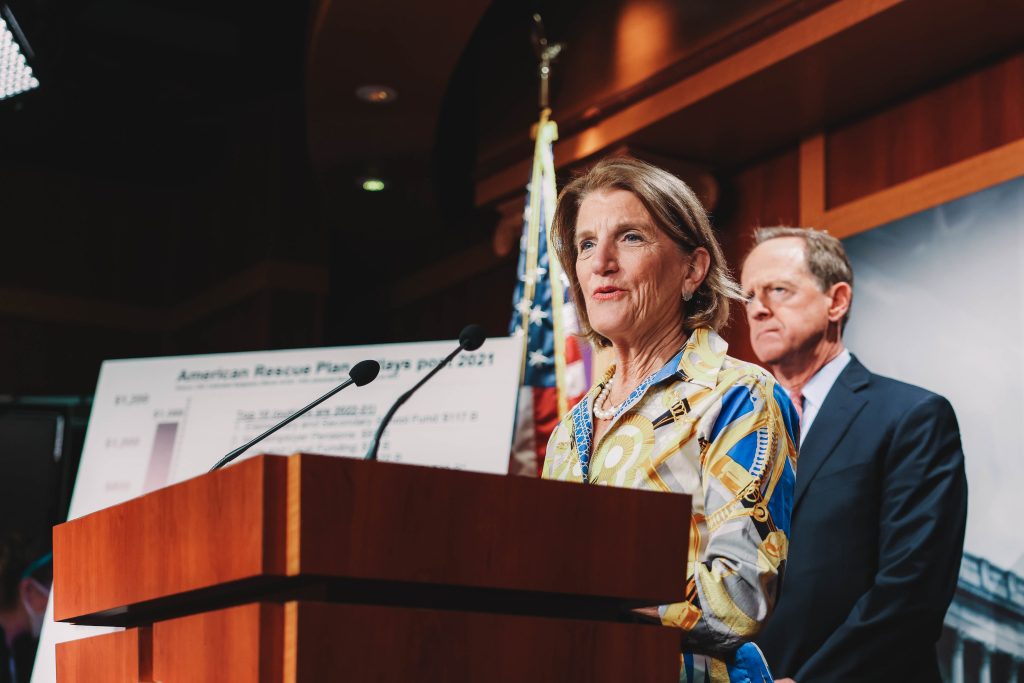How both Democrats and Republicans alike traded away their principles for bipartisanship in the Senate’s transportation proposal
Last week, Democrats and Republicans in the Senate Environment and Public Works Committee unanimously passed a transportation reauthorization bill that would make reducing emissions, improving safety, and providing equitable access impossible. It’s clear that Democrats traded in their goals for “bipartisanship.” But so did Republicans.

Transportation is historically bipartisan. In the past couple of decades, this has been because it was the one policy area where Democrats and Republicans could agree to undermine their own goals for the sake of “bipartisanship,” consistently passing bills that make U.S. transportation inefficient, expensive, unsafe, unsustainable and in poor condition. They both favor flexibility and deference over accountability for good outcomes and guaranteeing the taxpayer a good return for their investment.
It doesn’t have to be this way, we wrote last week when we highlighted three effective and bipartisan policies the Senate Environment and Public Works Committee could incorporate into its reauthorization proposal. But unfortunately it was this way—last Wednesday this committee passed a deeply broken yet “bipartisan” bill, the Surface Transportation Reauthorization Act of 2021 (STRA).
We have discussed how Senate Democrats lost big: this bill makes no real effort to reduce emissions, reduce the impact of transportation on Black and Brown communities, or make our roads safer. But Senate Republicans lost big too. Here’s how:
1. Billions of taxpayer dollars will get wasted
Republicans often talk about avoiding government waste. Yet this bill—supported by every Republican on the EPW Committee—wastes government resources and taxpayer dollars by design. How? It’s simple: pumping billions into widening and expanding highways without any plan to maintain them or their existing system creates billions in new liabilities. Billions.
In a press release on the bill’s passage, Ranking Member Shelley Moore Capito (R-WV) said that the bill will take “meaningful steps to repair our country’s crumbling roads and bridges.” But this just isn’t true. STRA doesn’t require that states spend federal highway dollars on maintenance before expansion. This is a huge problem because states rarely spend the majority of their federal funds on maintenance—in fact, many states even spend more on expansion than maintenance.
The Federal Highway Administration (FHWA) estimates that the cost of repairing our backlog of maintenance needs is $435 billion, and a recent Washington Post analysis found that one-fifth of the nation’s major roads were rated in poor condition in 2019. Yet “more than one-third of states’ capital spending on roads that year, $19 billion, went toward expanding the road network rather than chipping away at the backlog.”
Senator Joni Ernst (R-IA) praised STRA for including her “Billion Dollar Boondoggle Act” in the bill, which would require that projects over a billion dollars and behind schedule be “disclosed” to the public (as if they aren’t already). She specifically complained about rail projects. But what should we call a highway expansion that runs over budget yet can pull down ever increasing federal highway funds to help cover the cost without even having a plan to maintain it when it is done, much less the rest of their system? When the bill comes due, leaders turn to the taxpayer or even seek to raise taxes to pay for it. [For the record, T4A does not oppose a gas tax increase. We oppose any new funding for bad policy.]
STRA is $303.5 billion spent over five years. Without any requirement that that money be spent on maintenance, we will spend billions to do exactly what we’ve done to create our current monster backlog of maintenance needs (more on that below). That is not protecting against government waste.
2. Congestion will get worse
Everyone hates traffic, but Republicans apparently don’t hate it enough to actually reduce it. Instead of acknowledging that highway expansions have only led to more traffic congestion, Republicans (and Democrats) are supporting the same-old “congestion relief” strategy: widening and expanding roadways.
Between 1993 and 2017, the U.S, added 30,511 new freeway lane-miles of road in the largest 100 metropolitan areas—an increase of 42 percent. That rate of freeway expansion significantly outstripped the 32 percent growth in population in those regions over the same time period. Yet this strategy made congestion worse—delay is up by a staggering 144 percent, as we found in our report, the Congestion Con. None of the largest 100 cities saw congestion decrease or even increase just a little, even those that lost population and added highway capacity.
We know that Republican senators, like Ernst, understand the value of using data to spend transportation funds on projects that improve access to jobs and services the most. That’s why Senator Ernst co-sponsored the COMMUTE Act, a bill that would create a pilot program to help state DOTs and MPOs make decisions this way. This approach looks at the whole trip and whether you get where you are going, rather than whether traffic speeds in certain areas are high (which is what we use today). Yet the overwhelming majority of funding in STRA remains targeted to moving cars faster, a policy that has only made our congestion problems worse.
3. Roads will stay deadly
Senator John Boozman of Arkansas praised how this bill will improve roadway safety, specifically highlighting the “restoration of flexibility for Highway Safety Improvement Program funds to better protect motorists, cyclists and pedestrians.” Oh my.
Both parties seem to think that states need “flexibility” to improve safety. But do they really need flexibility to set targets and organize funding around having more people die on our roadways next year than died in the previous year? That’s our current approach and what STRA maintains.
A more charitable take would be that states need the flexibility to be passive to safety problems because it is beyond their control, said our director Beth Osborne. But they will still ask the taxpayer to give them more money to “fix” it, using roadway designs that are proven to be dangerous, like slip lanes and wide roads with high speeds near lots of points of conflict and children walking to school.
4. Local priorities will be overruled and economic opportunity disrupted
Republicans strongly emphasize giving states the flexibility to spend federal dollars as they believe is necessary, even if it undermines the desires of a local community. Which it often does. STRA continues this tradition by allowing states to design high-speed surface roadways that disconnect and disrupt local communities, trail networks, and undermine Vision 0 efforts—over the objection of the local leadership and the population.
And despite Senator Capito saying that STRA improves access to economic opportunities, this bill (like the current system) largely allows only movement by vehicle, an expensive proposition for American households. The current system has increased how much everyone has to drive and increased the exposure to danger for those trying to walk around or access transit. Hardly equitable access to economic opportunity. This approach also ignores legions of research demonstrating how safe roads and transit access attracts businesses to local communities.
Senator Capito also praised the provisions in the bill that focused on “rural areas, like West Virginia.” But there is nothing in STRA to improve transportation access for the over one million rural households that have zero access to a vehicle.
Both parties lost big in this bill
“Like any successful collaborative effort, neither side got everything they want, but I am glad we were able to find common ground and put forward a bipartisan plan to rebuild and revive America’s roads and bridges,” Senator Kevin Cramer (R-ND) said when STRA was released.
But neither side got much of anything they wanted. STRA won’t “rebuild or revive America’s roads and bridges”—it will undermine all efforts to bring our ginormous maintenance backlog in check and double down on a transportation system where congestion keeps getting worse. People will have to spend more on transportation and taxpayers will have to spend more to make up for these failures. Both Democrats and Republicans lost big in this bill.
As our communications director Steve Davis said: if bipartisanship is the goal, the broken status quo is the result.




















4 Comments